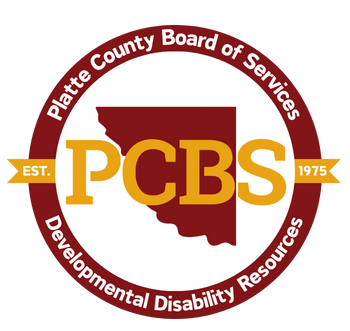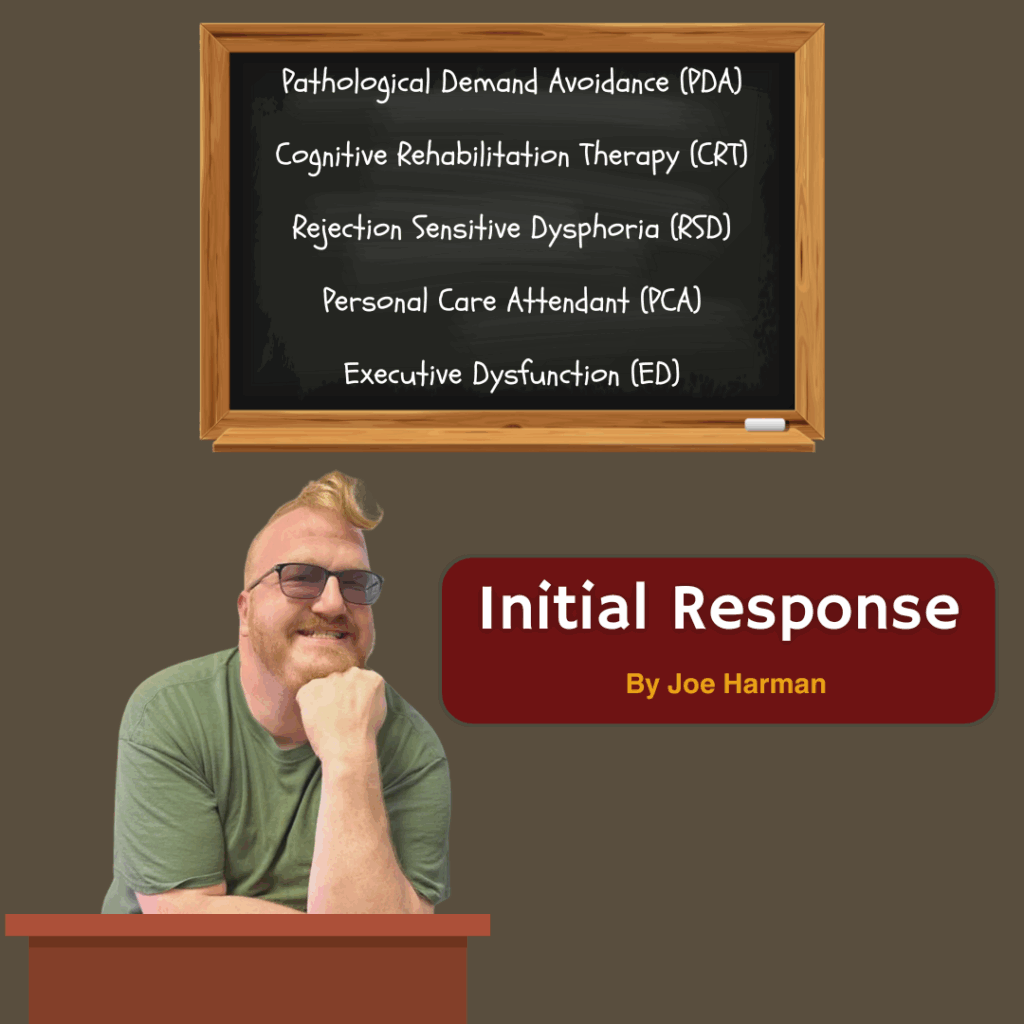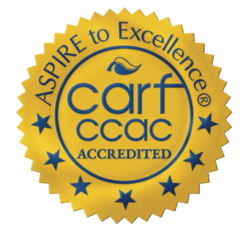Hey gang, it’s me, Joe Harman, your favorite autistic neurodivergent social recreation center manager/non-practicing stand-up comedian with an intense Muppet special interest. If I’m not your favorite person that fits that description, I apologize and request their contact info; they sound rad as hell! One of the things I always strive to do with these pieces is to make sure to explain terms used within both the disability community and support industry. I try to make sure you understand context and that these comedic essays are just educational enough that I earn my paycheck as a lived-experience neurodivergence consultant. Although, some pop culture references are intentionally left unexplained to reward all the cool people who get excited by terms like Gozer the Gozerian, Link Hogthrob of the S.S. Swinetrek, or Rex Manning Day. But that can be disruptive for those of us that are in the industry and already know all of the terms and acronyms, so this is for you folk: DSPs and PCAs usually have CPR and L1MA training and consult ISPs and IEPs devised by SCs and CMs to decide best practices of ABA, CBT, CRT¹, and CRT² (and maybe CRT³ but preferably not CRT⁴) for individuals who deal with ASD, BPD, BD, ADHD, DS, and other I/DD conditions as described in the DSM-V (that’s a 5, not a V). Translations of that sentence may vary as DSP (Disability Support Professional) and PCA (Personal Care Attendant) both represent multiple phrases (at least 5 for each) that mean essentially the same thing. The problem is though that even somebody in the industry who recognizes all of those initials might not recognize the ones used by independent neurodivergents who don’t need staff but still deal with much of what our support-dependent peers do. My neurotypical coworkers in disability support services sometimes give me confused looks when I explain that their client’s behavior might be due to RSD, PDA, or ED; mostly because they don’t know what public displays of affection or erectile dysfunction have to do with neurodivergence (more than you might think, but that’s not what I’m talking about in this family-friendly essay).
Rejection Sensitive Dysphoria (RSD) is a really fancy term for when someone’s brain excessively produces the chemicals that make us feel rejected, which in turn triggers excessive panic and other dangerously excessive responses. (Did I use “excessive” excessively?) In autism terms, autistics tend to have an all-or-nothing response to many (if not most) stimuli that triggers either a maximum or minimum psychological/chemical response: the things we love (like special interests) often trigger the maximum amount of pleasure and satisfaction chemicals while things we dislike (like sensory overload) trigger the maximum amount of discomfort and panic chemicals. It’s not just explicit rejection; RSD reacts to any perceived disruption in expectations: sudden change in plans (my plans were rejected), denial of offerings (they rejected my gifts) or any perceived exclusions (I wasn’t invited because they reject me). RSD isn’t in many medical books as it is not (yet) aclinical term, but it still helps neurodivergents recognize and explain the unique phenomena that causes us to start sobbing when a friend is too busy to visit or have a full meltdown because our same-food chicken nugget brand changed its recipe to a new texture. To be clear, we also don’t want us to be reacting that way; it’s unpleasant, disruptive, and one of the reasons I often wear a T-shirt that says, “Not an (expletive), Just Autistic”. This is exactly why things like CBT (Cognitive Behavior Therapy) are so important to neurodivergents even if they don’t have mental health issues; they help us recognize that we are not our feelings. Especially when my “feelings” are actually a toxic amount of adrenaline caused by the grocery store being out of Ben & Jerry’s Gimme S’more pints. Thanks to therapy tools, I’ve learned to ride out the wave of adrenaline until I notice there’s some Tonight Dough still left!
Pathological Demand Avoidance (PDA) is another behavioral profile you won’t find in the Diagnostic Statistical Manual for Mental Disorders-V, probably because every parent would assume their children had it if it was. PDA behaviors are an example of how neurodivergents generally differ from neurotypicals when pursuing the same outcomes: neurotypicals are more likely to follow the masses to avoid rejection while neurodivergents are more likely to avoid the masses to avoid the possibility of rejection. For many neurodivergent people, demand avoidance isn’t defiance— it’s a learned response to being expected to comply with things we can clearly see aren’t working. Just because something is common doesn’t mean it’s good: feedback surveys aren’t listening, inspirational posters aren’t morale, and mandatory fun isn’t fun. When you’re constantly pressured to go along with things that feel wrong or hollow, opting out starts to feel like the only honest response. In my opinion, avoiding unexplained demands is just good policy— why would I give a bully my lunch money just because he tells me to? If I’m going to have a problem no matter what, why not take my chances on the unknown threat instead of the guaranteed extortion? Unfortunately, as many parents and DSPs have learned, this is the same attitude neurodivergents have when asked to do things for health and hygiene. “Why endure tooth brushing sensitivity if it hurts as much as cavities?” “Why cut out carbs and sugar if the crash helps fight high-energy anxiety attacks?” “What do you mean ‘warmed-up’? I thought the stretching and jogging WAS the exercise.” The short answer to everything: everyone’s body betrays them, and you never know when, so take care of yours.
Executive Dysfunction is a condition many neurodivergent folks deal with that makes executing/accomplishing even basic tasks difficult. It’s not universal, but my best explanation is that because ND folk are wired differently, sometimes the steps for tasks get put out of order without us realizing it. I had an exercise that used to help explain it to my peers/clients, but that just led to them going on about their “dysfunction”. Basically, you break down a simple task into at least 3 steps and challenge them to do those steps out of order. “Turning off the lights requires: 1. Standing up. 2. Walking to the light switch. 3. flipping the switch. If you think order doesn’t matter, then please try to do those steps out of order.” If my personal history is any indication, you will either spend an hour watching someone trying to walk without standing up first or a light switch will need replacing because a shoe was thrown at it. Executive dysfunction in neurodivergence either replicates or causes several co-morbidities (side-by-side conditions) like dyslexia, dyscalculia, or discombobulation. That last one isn’t a clinical condition; I just love any excuse to use that word. For many neurodivergents, executive dysfunction just means brain-farting on a common word or double-tapping the wrong key so that you write “inaprropriate coomments” instead of “reasonable, direct response.” For others, it’s forgetting you already took your meds, skipping key driving steps, or eating too much because the “enjoy it” step got stuck on loop. (A couple extra “enjoy it”s is fine. Thirty-seven is not.) This is what executive dysfunction really looks like—not laziness, not carelessness, just an invisible glitch in the task-doing machine.
So when someone drops an acronym like RSD, PDA, or ED in a conversation, it’s not just jargon or the new Law and Order spinoff. It’s shorthand for very real, often painful challenges. These terms are survival tools, and saying them in full makes us vulnerable— like a middle schooler named DJ terrified someone will find out that they’re actually Dinglebert Jortson. These acronyms aren’t a secret code or exclusion tactic—they’re a way to say what needs saying without getting tangled in a conversation that nobody’s prepared to have. Like trying to explain that you ate a whole large pizza because of 37 “enjoy its”. Thanks for reading!
*CRT¹— Cognitive Rehabilitation Therapy (CRT)
*CRT²— Complex Rehabilitation Technology
*CRT³— Critical Race Theory
*CRT⁴— Community Response Team



